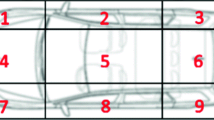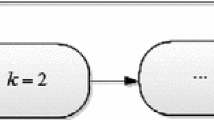Abstract
Productivity, cost, and completion time are regarded as performance measures for assembly production management. The traditional decomposition of Assembly Line Balancing (ALB) and Car sequencing (CS) does not work well, especially when operations belonging to different car types are sequence-dependent and time overlap between two successive workstations is allowed. In this paper, we first use a motivating industrial-scale example to demonstrate that the traditional ALB/CS decomposition method could not satisfy modern continuous production demands in a flexible assembly line. Then, we present a new optimization objective to scale the Operation Process Precision (OPP) that relates to the operation assignment sequence. Lastly, we propose a two-stage hierarchical optimization framework to solve the CS, the operation allocation, and the operation sequence problems. This framework consists of (a) a new Mixed Integer Linear Programming (MILP) model for sequencing automobiles and allocating their operations to each station, and (b) a novel MILP model for determining the operation sequence and timing of each car type. The motivating industrial case is revisited with the proposed framework to illustrate its validity and efficiency.
Similar content being viewed by others
References
Feldmann K., Rottbauer H., Roth N.: Relevance of assembly in global manufacturing. Ann. CIRP 45, 545–552 (1996)
Larkin J.: The 1,000,000th vehicle produced at BMW manufacturing Co. in spartanburg automotive industries. Automot. Ind. 186, 55 (2006)
Rungtusanatham M.J., Salvador F.: From mass production to mass customization: Hindrance factors, structural inertia, and transition hazard. Prod. Oper. Manage. 17, 385–396 (2008)
Fournier X., Agard B.: Improvement of earliness and lateness by postponement on an automotive production line. Int. J. Flexible Manuf. Syst. 19, 107–121 (2007)
Hazbany, S., Gilad, I., Shpitalni, M.: About the efficiency and cost reduction of parallel mixed-model assembly lines. The 17th CIRP Design Conference, Berlin, Germany, March 27–28 (2007)
Matanachai S., Yano C.A.: Balancing mixed-model assembly lines to reduce work overload. IIE Trans. 33, 29–42 (2001)
Gunasekaran A., Ngai E.: Modeling and analysis of build-to-order supply chains. Eur. J. Oper. Res. 195, 319–334 (2009)
Fleszar K., Hindi K.S.: An enumerative heuristic and reduction methods for the assembly line balancing problem. Eur. J. Oper. Res. 145, 606–620 (2003)
Sawik T.J.: Scheduling flowshops with parallel machines and finite in-process buffers by multilevel programming. Lecture Notes Control Inf. Sci. 113, 691–700 (1988)
Peeters M., Degraeve Z.: An linear programming based lower bound for the simple assembly line balancing problem. Eur. J. Oper. Res. 168, 716–731 (2006)
Drexl A., Kimms A.: Sequencing JIT mixed-model assembly lines under station-load and part-usage constraints. Manage. Sci. 47, 480–491 (2001)
Drexl A., Kimms A., Matthießen L.: Algorithms for the car sequencing and the level scheduling problem. J. Sched. 9, 153–176 (2006)
Joly A., Frein Y.: Heuristics for an industrial car sequencing problem considering paint and assembly shop objectives. Comput. Ind. Eng. 55, 295–310 (2008)
Boysen N., Fliedner M., Scholl A.: Sequencing mixed-model assembly lines: Survey, classification and model critique. Eur. J. Oper. Res. 192, 349–373 (2009)
Gravel M., Gagné C., Price W.L.: Review and comparison of three methods for the solution of the car sequencing problem. J. Oper. Res. Soc. 56, 1287–1295 (2005)
Prandtstetter M., Raidl G.: An integer linear programming approach and a hybrid variable neighborhood search for the car sequencing problem. Eur. J. Oper. Res. 191, 1004–1022 (2008)
Sawik T.: Monolithic vs. hierarchical balancing and scheduling of a flexible assembly line. Eur. J. Oper. Res. 143, 115–124 (2002)
Lee S.C., Hsu T.S., Chuang S.P., Yang C.L.: Enhanced performance of overlap flow-shop scheduling involving reworking and a time buffer. Int. J. Adv. Manuf. Technol. 39, 142–150 (2008)
Scholl A., Boysen N., Fliedner M.: The sequence-dependent assembly line balancing problem. OR Spectrum 30, 579–609 (2008)
Floudas C.A., Lin X.: Continuous-time versus discrete-time approaches for scheduling of chemical processes: A review. Computes Chem. Eng. 28, 2109–2129 (2004)
Floudas C.A., Lin X.: Mixed integer linear programming in process scheduling: modeling, algorithms, and applications. Ann. Oper. Res. 139, 131–162 (2005)
Ierapetritou M.G., Floudas C.A.: Effective continuous-time formulation for short-term scheduling: 1. Multipurpose batch processes. Ind. Eng. Chem. Res. 37, 4341–4359 (1998)
Ierapetritou M.G., Floudas C.A.: Effective continuous-time formulation for short-term scheduling 2. continuous and semi-continuous process. Ind. Eng. Chem. Res. 37, 4360–4374 (1998)
Ierapetritou M.G., Hene T.S., Floudas C.A.: Effective continuous-time formulation for short-term scheduling 3. Multiple intermediate due dates. Ind. Eng. Chem. Res. 38, 3446–3461 (1999)
Lin X., Floudas C.A.: Design, synthesis and scheduling of multipurpose batch plants via an effective continuous-time formulation. Comput. Chem. Eng. 25, 665–674 (2001)
Lin X., Floudas C.A., Modi S., Juhasz N.M.: Continuous-time optimization approach for medium-range production scheduling of a multiproduct batch plant. Ind. Eng. Chem. Res. 41, 3884–3906 (2002)
Lin X., Chajakis E.D., Floudas C.A.: Scheduling of tanker lightering via a novel continuous-time optimization framework. Ind. Eng. Chem. Res. 42, 4441–4451 (2003)
Lin X., Janak S.L., Floudas C.A.: A new robust optimization approach for scheduling under uncertainty: I Bounded uncertainty. Comput. Chem. Eng. 28, 1069–1085 (2004)
Janak S.L., Lin X., Floudas C.A.: Enhance continuous-time unit-specific event-based formulation for short-term scheduling of multipurpose batch processes: resource constraints and mixed storage policies. Ind. Eng. Chem. Res. 43, 2516–2533 (2004)
Janak S.L., Lin X., Floudas C.A.: Comments on “Enhanced continuous-time unit-specific event-based formulation for short-term scheduling of multipurpose batch processes: resource constraints and mixed storage policies”. Ind. Eng. Chem. Res. 44, 426 (2005)
Janak S.L., Floudas C.A., Kallrath J., Vormbrock N.: Production scheduling of a large-scale industrial batch plant I. Short-term and medium-term scheduling. Ind. Eng. Chem. Res. 45, 8234–8252 (2006)
Janak S.L., Floudas C.A., Kallrath J., Vormbrock N.: Production scheduling of a large-scale industrial batch plant II. Reactive scheduling. Ind. Eng. Chem. Res. 45, 8253–8269 (2006)
Janak S.L., Lin X., Floudas C.A.: A new robust optimization approach for scheduling under uncertainty II Uncertainty with known probability distribution. Comput. Chem. Eng. 31, 171–195 (2007)
Janak S.L., Floudas C.A.: Improving unit-specific event based continuous-time approaches for batch processes: Integrality gap and task splitting. Comput. Chem. Eng. 32, 913–955 (2008)
Shaik M.A., Janak S.L., Floudas C.A.: Continuous-time models for short-term scheduling of multipurpose batch plants: a comparative study. Ind. Eng. Chem. Res. 45, 6190–6209 (2006)
Shaik M.A., Floudas C.A.: Improved unit-specific event-based model continuous-time model for short-term scheduling of continuous processes: rigorous treatment of storage requirements. Ind. Eng. Chem. Res. 46, 1764–1779 (2007)
Shaik M.A., Floudas C.A.: Unit-specific event-based continuous-time approach for short-term scheduling of batch plants using RTN Framework. Comput. Chem. Eng. 32, 260–274 (2008)
Shaik M.A., Floudas C.A.: Novel unified modeling approach for short-term scheduling. Ind. Eng. Chem. Res. 48, 2947–2964 (2009)
Li J., Karimi I.A., Srinivasan R.: Recipe determination and scheduling of gasoline blending operations. AIChE J. 56, 441–465 (2010)
Susarla N., Li J., Karimi I.A.: A novel approach for short-term scheduling of multipurpose batch plants. AIChE J. 56, 1859–1879 (2010)
Li J., Floudas C.A.: Optimal event point determination for short-term scheduling of multipurpose batch plants. Ind. Eng. Chem. Res. 49, 7446–7469 (2010)
Brooke A., Kendrick D., Meeraus A., Raman R.: GAMS: A User’s Guide. GAMS Development Corporation, South San Francisco (2003)
Author information
Authors and Affiliations
Corresponding authors
Electronic Supplementary Material
Rights and permissions
About this article
Cite this article
Tang, Q., Li, J., Floudas, C.A. et al. Optimization framework for process scheduling of operation-dependent automobile assembly lines. Optim Lett 6, 797–824 (2012). https://doi.org/10.1007/s11590-011-0303-5
Received:
Accepted:
Published:
Issue Date:
DOI: https://doi.org/10.1007/s11590-011-0303-5




